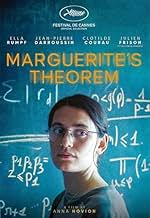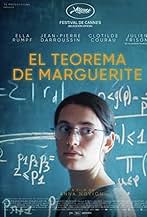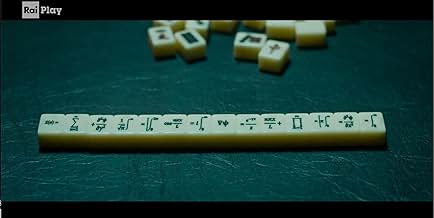PUNTUACIÓN EN IMDb
6,8/10
2,2 mil
TU PUNTUACIÓN
En el día de la presentación de su tésis, una brillante alumna de matemáticas de la prestigiosa Escuela Normal Superior de Francia deja todo de lado cuando un error sacude la certeza de su b... Leer todoEn el día de la presentación de su tésis, una brillante alumna de matemáticas de la prestigiosa Escuela Normal Superior de Francia deja todo de lado cuando un error sacude la certeza de su bien planificada vida para comenzar de nuevo.En el día de la presentación de su tésis, una brillante alumna de matemáticas de la prestigiosa Escuela Normal Superior de Francia deja todo de lado cuando un error sacude la certeza de su bien planificada vida para comenzar de nuevo.
- Premios
- 4 premios y 1 nominación en total
Xiaoxing Cheng
- M. Kong
- (as Maurice Cheng)
Karl Ruben Noel
- Le danseur
- (as Karl-Ruben 'Rubix' Noël)
Pakirathan Sulakshan
- Le mathématicien
- (as Sulax Pakirat)
Argumento
¿Sabías que...?
- CuriosidadesAccording to a NY Times article a reward of 1 million dollars was offered offered from 2000 to 2002. Currently there is no official monetary prize specifically for proving or disproving Goldbach's Conjecture similar to the prizes offered for some other famous problems, such as the Millennium Prize Problems.
Reseña destacada
Here is a movie that will interest my mathematician friends. I look forward to them watching it and sharing their impressions. 'Le théorème de Marguerite' (2023) is a variation on the classic formula 'boy meets girl, boy loses girl, boy gets girl back', with a few changes. First of all, the lead character is a woman, a young and brilliant mathematician who will meet a boy, so it's more like 'girl meets boy'. And yes, both the girl and the boy are mathematicians, so 'a mathematician girl meets a mathematician boy'. Otherwise, the formula applies - in cinema and in mathematics. The film by director Anna Novion is a film about the passion for mathematics. There aren't many movies that bring math heroes to the screen, but a few of them are memorable. 'Good Will Hunting' and 'A Beautiful Mind', for example, also offered us heroes whose life and passion are consumed in front of blackboards filled with mathematical equations. 'Le théorème de Marguerite' aims to join this select club.
The heroine of the film is called Marguerite Hoffman. She is a brilliant PhD student at one of the most prestigious colleges in France and mathematics is her whole life. The doctoral thesis supervised by Professor Werner is a demonstration of one of the most famous problems that mathematicians have faced for centuries: the Goldbach conjuncture. (for the curious: 'Any even number is the sum of two prime numbers'). The proposition was verified by numerical computers until they ran out of power, but it was never proved. On the day of the thesis presentation, however, a catastrophe occurs. Julien, another brilliant young mathematician who had joined Wener's team a few days before, points out a fatal flaw in the proof. Marguerite has a total mental breakdown and decides to abandon mathematics and the teacher whom she blames for betraying her by associating with the new student. She will try to work as a saleswoman, she will meet Noa, a dancer with whom she shares a rented apartment and who will try to bring her back to life. Marguerite, however, may leave mathematics, but mathematics does not leave her. The talent will help her become a brilliant mahjong player (a complex Chinese game with stones) and her orderly mathematical mind will struggle with feelings for the rival she associates with in solving the impossible problem.
Can love be rationalized? Can human mind function in the absence of feelings? You will receive answers to these questions in the story Anna Novion co-wrote. The main problem with the film is, in my opinion, the fact that these answers are kind of what we expected. Focus is on mathematics and love. Social aspects that might have been interesting - the position of women in academia, the life of the Chinese community in Paris - are touched upon only tangentially. The plot is also quite predictable. A bit more boldness and a story with more surprises wouldn't hurt. Fortunately, much of these weaker parts are offset by Ella Rumpf's formidable acting performance. The actress is no longer very young, she is more than ten years older than the heroine she plays in this film and has a filmography of almost 20 films behind her. And yet, with this role she won the Lumiere award for 'best female revelation' and four other awards - completely deserved. Her Marguerite Hoffman is intelligent and vulnerable, passionate to the point of obsession when it comes to the mathematics she has known since childhood and when it comes to the love she discovers late. With any luck for her and us viewers, 'Le théorème de Marguerite' is the first major film of a great actress. Among the other actors in the cast, I cannot skip Jean-Pierre Darroussin in the role of the teacher who guides the heroine's steps in mathematics even when their paths diverge, alongside the girl's mother played by Clotilde Courau. Goldbach's conjuncture is still waiting for its demo, and we, the viewers, are waiting for the future films of director Anna Novion and actress Ella Rumpf.
The heroine of the film is called Marguerite Hoffman. She is a brilliant PhD student at one of the most prestigious colleges in France and mathematics is her whole life. The doctoral thesis supervised by Professor Werner is a demonstration of one of the most famous problems that mathematicians have faced for centuries: the Goldbach conjuncture. (for the curious: 'Any even number is the sum of two prime numbers'). The proposition was verified by numerical computers until they ran out of power, but it was never proved. On the day of the thesis presentation, however, a catastrophe occurs. Julien, another brilliant young mathematician who had joined Wener's team a few days before, points out a fatal flaw in the proof. Marguerite has a total mental breakdown and decides to abandon mathematics and the teacher whom she blames for betraying her by associating with the new student. She will try to work as a saleswoman, she will meet Noa, a dancer with whom she shares a rented apartment and who will try to bring her back to life. Marguerite, however, may leave mathematics, but mathematics does not leave her. The talent will help her become a brilliant mahjong player (a complex Chinese game with stones) and her orderly mathematical mind will struggle with feelings for the rival she associates with in solving the impossible problem.
Can love be rationalized? Can human mind function in the absence of feelings? You will receive answers to these questions in the story Anna Novion co-wrote. The main problem with the film is, in my opinion, the fact that these answers are kind of what we expected. Focus is on mathematics and love. Social aspects that might have been interesting - the position of women in academia, the life of the Chinese community in Paris - are touched upon only tangentially. The plot is also quite predictable. A bit more boldness and a story with more surprises wouldn't hurt. Fortunately, much of these weaker parts are offset by Ella Rumpf's formidable acting performance. The actress is no longer very young, she is more than ten years older than the heroine she plays in this film and has a filmography of almost 20 films behind her. And yet, with this role she won the Lumiere award for 'best female revelation' and four other awards - completely deserved. Her Marguerite Hoffman is intelligent and vulnerable, passionate to the point of obsession when it comes to the mathematics she has known since childhood and when it comes to the love she discovers late. With any luck for her and us viewers, 'Le théorème de Marguerite' is the first major film of a great actress. Among the other actors in the cast, I cannot skip Jean-Pierre Darroussin in the role of the teacher who guides the heroine's steps in mathematics even when their paths diverge, alongside the girl's mother played by Clotilde Courau. Goldbach's conjuncture is still waiting for its demo, and we, the viewers, are waiting for the future films of director Anna Novion and actress Ella Rumpf.
- dromasca
- 2 abr 2024
- Enlace permanente
Selecciones populares
Inicia sesión para calificar y añadir a tu lista para recibir recomendaciones personalizadas
- How long is Marguerite's Theorem?Con tecnología de Alexa
Detalles
- Fecha de lanzamiento
- Países de origen
- Sitios oficiales
- Idiomas
- Títulos en diferentes países
- Marguerite's Theorem
- Empresas productoras
- Ver más compañías en los créditos en IMDbPro
Taquilla
- Presupuesto
- 2.870.000 € (estimación)
- Recaudación en todo el mundo
- 1.162.522 US$
- Duración1 hora 53 minutos
- Color
- Relación de aspecto
- 2.39:1
Contribuir a esta página
Sugerir un cambio o añadir el contenido que falta

Principal laguna de datos
What is the Canadian French language plot outline for El teorema de Marguerite (2023)?
Responde

























